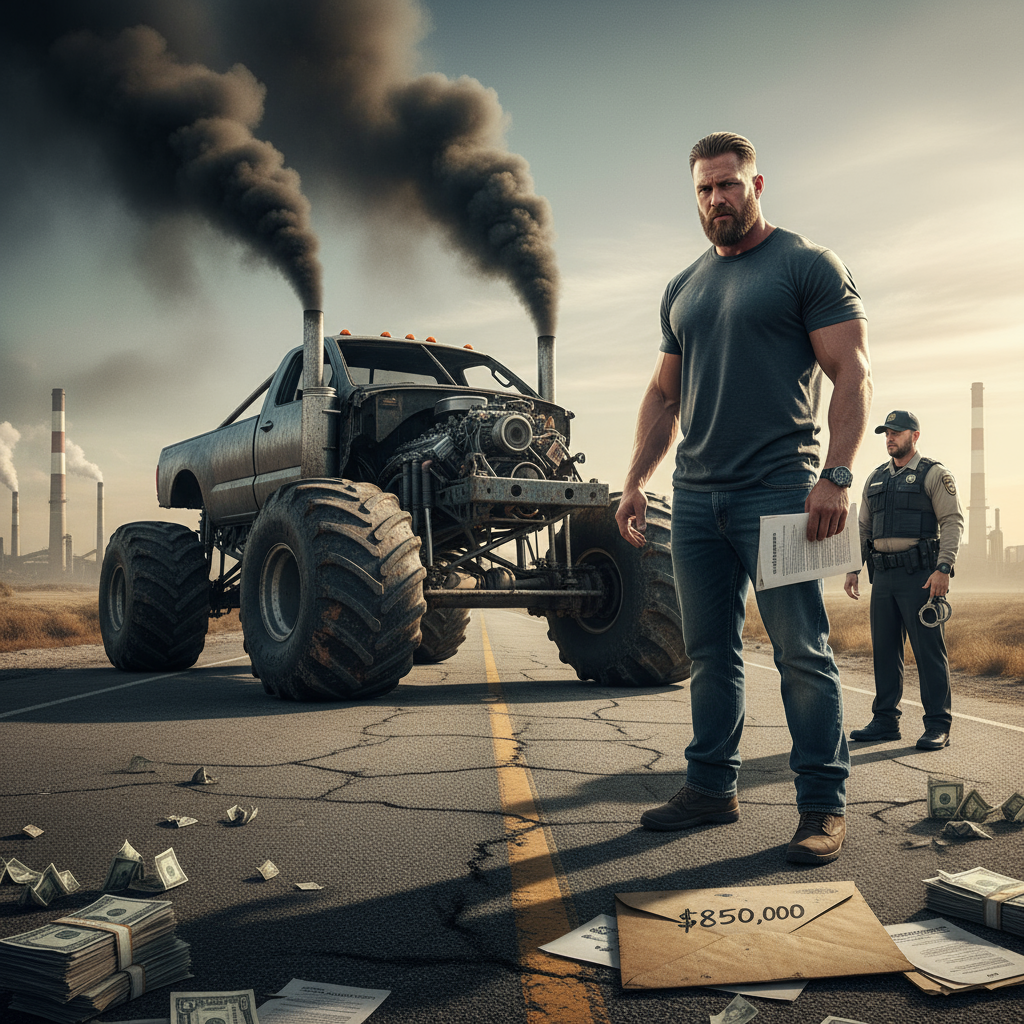When the Rubber Meets the Road: Heavy D, Emissions, and an $850K Environmental Bill

The world of custom trucks, larger-than-life personalities, and viral online content often seems invincible. But as influencer ‘Heavy D’ of the Diesel Brothers recently discovered, even the biggest builds and most charismatic stars aren’t exempt from the long arm of the law – particularly when environmental regulations are involved. News recently broke regarding his arrest for failing to pay a staggering $850,000 in environmental lawsuit fees, sending ripples through the automotive and influencer communities alike. This isn’t just about a missed payment; it’s a stark reminder that even in the pursuit of extreme automotive artistry, environmental responsibility remains a critical, non-negotiable factor.
This incident shines a harsh spotlight on the ongoing tension between powerful diesel modifications and increasingly stringent environmental protections. It forces us to examine the responsibilities of creators, the impact of their content, and the very real consequences of ignoring legal mandates designed to protect our air quality. Let’s delve deeper into what led to this arrest, the broader implications for the custom vehicle industry, and the lessons we can all learn.
The Road to Arrest: A Long-Running Legal Battle

To understand Heavy D’s current predicament, we need to rewind a few years. The Diesel Brothers – David “Heavy D” Sparks, Dave “Diesel Dave” Kiley, Josh “Redbeard” Stuart, and Keaton “The Muscle” Hoskins – rose to fame through their YouTube channel and Discovery Channel show, showcasing their wild, custom diesel truck builds. Their creative modifications often included “emissions delete” kits, which remove components designed to control harmful pollutants from diesel exhaust. While these modifications can boost horsepower and torque, they are unequivocally illegal under the Clean Air Act.
In 2017, the Utah Physicians for a Healthy Environment (UPHE) filed a lawsuit against the Diesel Brothers, alleging that their practice of tampering with emissions controls violated federal environmental law. The lawsuit highlighted the significant health risks associated with increased particulate matter and nitrogen oxides released by modified vehicles, particularly in areas like Salt Lake City, which often experiences poor air quality due to inversions.
The legal battle was protracted, with multiple rulings against the Diesel Brothers. In 2020, a federal judge ordered the group and their associated businesses to pay nearly $850,000 in civil penalties and legal fees. Despite appeals, the judgment stood. This recent arrest of Heavy D underscores that these penalties were not merely symbolic – they were legally binding and had real-world consequences for non-compliance. His failure to satisfy the judgment directly led to the recent warrant and subsequent arrest, serving as a powerful demonstration that environmental regulations are enforced, and ignoring court orders carries significant weight.
Emissions Delete: Performance vs. Public Health
The allure of “emissions delete” kits is strong within certain segments of the diesel community. Enthusiasts often swear by the performance gains, improved fuel economy (though this is often debated), and the distinct aesthetic of a “rolling coal” exhaust plume. However, these perceived benefits come at a steep cost to public health and the environment.
Diesel exhaust contains a cocktail of harmful pollutants, including particulate matter (soot), nitrogen oxides (NOx), carbon monoxide, and various hydrocarbons. These substances contribute to respiratory illnesses, cardiovascular disease, cancer, and are major contributors to smog and acid rain. Modern diesel engines are equipped with sophisticated emissions control systems – such as Diesel Particulate Filters (DPFs), Selective Catalytic Reduction (SCR) systems, and Exhaust Gas Recirculation (EGR) – specifically designed to mitigate these dangers.
When these systems are removed, the vehicle’s emissions skyrocket, often to hundreds or even thousands of times higher than legal limits. The “rolling coal” phenomenon, where a modified diesel truck intentionally blasts thick black smoke, is a visible manifestation of this environmental transgression. While some argue it’s a matter of personal choice or “freedom,” the reality is that clean air is a shared resource, and the choices made about vehicle modifications have tangible, negative impacts on everyone, especially vulnerable populations.
Beyond Heavy D: Implications for the Custom Vehicle Industry and Influencers
Heavy D’s arrest isn’t an isolated incident; it’s a canary in the coal mine for the wider custom vehicle industry and the burgeoning world of automotive influencers. For years, there’s been a delicate balance, or perhaps an uneasy truce, between enthusiasts pushing the boundaries of modification and regulatory bodies attempting to enforce environmental laws. This case signals a clear shift: the hammer is coming down harder.
Suppliers of emissions defeat devices, custom shops performing the installations, and even content creators promoting such practices are all facing increased scrutiny. The Environmental Protection Agency (EPA) has been actively cracking down on manufacturers and sellers of these devices, issuing hefty fines and even pursuing criminal charges. The implications for influencers are particularly significant. As their platforms grow, so does their responsibility. Promoting illegal modifications, even implicitly, can expose them to legal liabilities. This incident should serve as a wake-up call for anyone in the automotive content space: what you create and endorse has real-world consequences, both legally and environmentally. Authenticity and passion are valuable, but they must operate within the bounds of law and ethical responsibility.
A Clear Message: Compliance is Key
The arrest of Heavy D for failing to pay environmental lawsuit fees sends an unambiguous message: environmental regulations are not merely suggestions. They are laws designed to protect public health and the planet, and there are severe repercussions for non-compliance. This isn’t about stifling creativity or dictating personal vehicle choices; it’s about holding individuals and businesses accountable for their environmental impact.
For the custom automotive scene, this means adapting. Innovation in vehicle modification can and should incorporate environmental responsibility. Developing high-performance, aesthetically pleasing vehicles that also meet or exceed emissions standards is the challenge of the future. For influencers, it means exercising due diligence, educating their audience responsibly, and understanding that their platform carries a significant ethical burden. The days of “emissions delete” kits being openly promoted without consequence are rapidly drawing to a close. The $850,000 bill, and the subsequent arrest, are a powerful testament to that reality.

